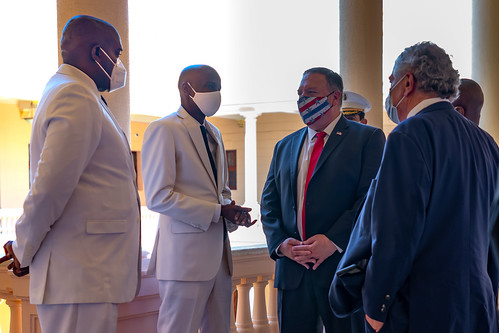Many who would deny prejudice or racism continue to apply centuries old stereotypes to Haitians with seeming impunity or even self-awareness.
"Third flight from Haiti lands with many COVID-infected passengers" and "COVID-infected flights from Haiti under scrutiny", noted two Toronto Sun headlines last month. Another Sun story reported, "questions are still swirling about two flights from Haiti that landed in Montreal last week, apparently with so many COVID-19 infected passengers that Health Canada said all rows were potentially impacted." A few days earlier Le Journal de Montre'al bellowed: "Deux vols en provenance d'Haà �ti bourre's de cas de COVID" (Two flights from Haiti full of COVID cases) while CTV declared "Many COVID-infected passengers aboard three Haiti-to-Montreal flights, federal data shows".
But the COVID-19 rate is far higher in Montre'al than Port-au-Prince so from a macro public health standpoint it makes little sense to be particularly worried about Haitians infecting Canadians. In fact, Haitians should be concerned about Canadians traveling there. Ostensibly, the Sun and other media are focused on Haiti because Ottawa delayed by 15 days (Jan 6 to Jan 21) implementing a requirement for inbound travelers to show a negative COVID-19 test.
While it's difficult to parse out legitimate public health concerns from deeply entrenched anti-Haitianism, historically it is clear that Haitians have repeatedly been stigmatized as diseased. Most infamously, Haitians were labeled as the originators of the HIV virus in the US in the early 1980s. As a result, the country's significant tourism industry basically collapsed overnight. Some Haitian exports were even blocked from entering the US!
The Centers for Disease Control (CDC) labeled Haitians a risk group, which gave rise to "the 4-H's" designation of Homosexuals, Hemophiliacs, Heroin addicts and Haitians. At the time the Canadian Red Cross publicly identified Haitians as a "high-risk" group for AIDS, the only nationality singled out. In 1983 they called on homosexuals and bisexuals with multiple partners, intravenous drug users, hemophiliacs and recent immigrants from Haiti to voluntarily stop giving blood. But, it's unclear if the incidence of AIDS in Haiti was greater than in the US. By 1987 it was lower in Haiti than in the US and other Caribbean nations.
Decades later the stigmatization remains. In 2017 US President Donald Trump reportedly said Haitian immigrants "all have AIDS" and in 2016 former MP Andre' Arthur claimed "Haiti is the country where AIDS started". The Quebec City radio host added that the "hopeless", "sexually deviant", nation should be taken over by France as in the "heyday of colonial Haiti" ("belle e'poque de l'Haà �ti colonial").
In another example of stigmatizing Haitians over disease, CDC incident manager for the Haiti cholera response Jordan W. Tappero blamed Haitian cultural norms for the 2010 cholera outbreak in that country. He told Associated Press journalist Jonathan Katz that Haitians don't experience the "shame associated with open defecation." As was then suspected and later confirmed, cholera was introduced to Haiti by a UN base that followed poor sanitation practices, dumping feces from recently arrived Nepalese troops into a stream people drank from. More than 10,000 Haitians died and hundreds of thousands were made ill as a result of the waterborne disease.
(Note: You can view every article as one long page if you sign up as an Advocate Member, or higher).






